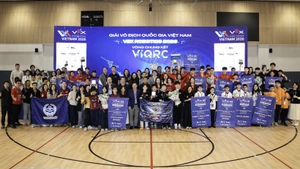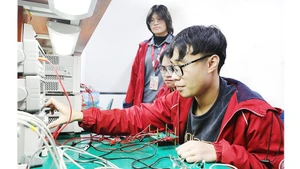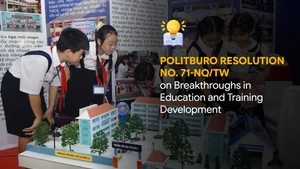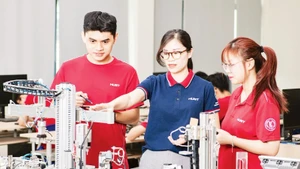So far, many universities and research institutes have taken the initiative in establishing incubators and startup support centres, and implementing projects closely linked to real-world innovation.
Building a startup ecosystem in schools
According to a report by the Ministry of Education and Training, more than 200 universities, research institutes, and nearly 300 educational institutions have carried out activities in startup and innovation. Many startup ideas developed by students have been implemented in practice and have shown initial positive results in communities.
One standout model is the startup ecosystem at Phenikaa University. Implementing the prime minister’s Decision No. 1665/QD-TTg (October 30, 2017) on approving the project on “Supporting pupils and students to start up until 2025” (Project 1665), Phenikaa University has launched a wide range of practical activities to promote startup in the university and expand connections with other educational institutions.
Assoc. Prof. Dr. Nguyen Phu Khanh, Vice Rector of Phenikaa University, stated that the university places great emphasis on raising awareness about startup, creating favourable conditions for students to access startup support systems both within and beyond the university. Phenikaa’s startup support model for student has been methodically developed to focus not only on equipping students with skills and knowledge, but also on nurturing a mindset of bold thinking and proactive action, encouraging innovation at its roots.
Between 2022 and 2024, over 5,000 students took part in innovation activities at the university, with 97 receiving commendations. These efforts were supported and mentored by 269 lecturers and 42 businessmen. Several notable projects have seen initial success, includingPKA Green Device - a smart waste treatment solution that made the top 10 in an international competition hosted by the US Embassy; and a science experiment kit project that quickly demonstrated commercial potential, earning over 100 million VND in revenue in November 2024 alone, with more than 1,000 orders placed via e-commerce platforms.
These achievements offer clear evidence of the effectiveness of building a startup and innovation model within educational institutions.
Startup and innovative activities have also been actively promoted at the University of Transport Technology through a series of concrete measures aimed at fostering students’ startup spirit and bridging academic training with practical application.
Dr. Dinh Quang Toan, Director of the Institute for Innovation and Digital Economy under the University of Transport Technology, shared that the university organises specialist seminars, roundtable discussions, and intensive training courses on startup thinking, business models, fundraising, and so on. Startup content is integrated into both the curriculum and extracurricular activities. Notably, the university has incorporated the “Innovative Startup” module into its compulsory soft skills course, and launched dedicated modules on science, technology and innovation, digital transformation, and the Enterprise Semester Scheme.
In addition, the university collaborates with businesses and experts to run over 20 startup skill training courses each year, while also maintaining the competition “University of Transport Technology’s students with Startup ideas” to encourage students to propose and realise innovative ideas.
So far, more than 50 startup ideas have been incubated at the university, including standout projects such as a smart contracted vehicle dispatching application, an intra-campus delivery model using electric vehicles for smart cities, and projects applying digital transformation and artificial intelligence to intelligent transportation systems.
From Phenikaa University’s support model to the hands-on experience at the University of Transport Technology, it is evident that each educational institution is taking proactive and creative approaches in implementing Project 1665, thus contributing to the formation of a sustainable startup ecosystem within universities.
Removing barriers
Despite these encouraging outcomes, Dr. Hoang Kim Toan from the Centre for Startup and Innovation at Hue University noted that startup activities at Vietnamese universities still face several challenges that must be addressed frankly and suitably.
A major concern is the imbalance between theory and practice in training programmes. Many startup education programmes still focus heavily on theoretical knowledge, with limited opportunities for hands-on experience and skill development. As a result, students have few chances to apply their learning to real-life situations.
Additionally, many universities lack financial resources, infrastructure, and experimental spaces to support startup, as well as early-stage investment funds. These are significant obstacles that hinder students from turning their ideas into reality.
The Ministry of Education and Training has proactively proposed various practical solutions to address these limitations and create more favourable conditions for startup and innovation in universities nationwide.
The first key solution is to continue completing policies that promote innovative startups, particularly by easing difficulties related to investment procedures, evaluation mechanisms, and project approval and implementation.
Furthermore, the ministry is considering and issuing special mechanisms to support the deployment and development of startup projects incubated in universities and vocational training institutions, especially those in economically disadvantaged areas.
Notably, the ministry will work with the Vietnam Bank for Social Policies to effectively implement preferential credit policies from the National Employment Fund and other credit sources. These are expected to be essential resources for supporting young people, students, and pupils in launching startups, helping them to not only create jobs for themselves but also generate positive ripple effects within their families and communities.
Startups are not merely a career option but a way for each student to shape their future with their own hands and minds. Since its launch in 2017, Project 1665 has produced many positive results. Startup and innovation content has been integrated into the curricula at various educational levels, especially in universities and colleges.
So far, more than 120 universities have included startup as a subject in their curricula, either as a compulsory or optional course. Over 65% of provinces and cities have implemented plans to support startups in secondary and high schools. Alongside this, the policy framework continues to improve, paving the way for important breakthroughs and a robust legal foundation that is expected to further propel startup activities in the education and training sector.
















